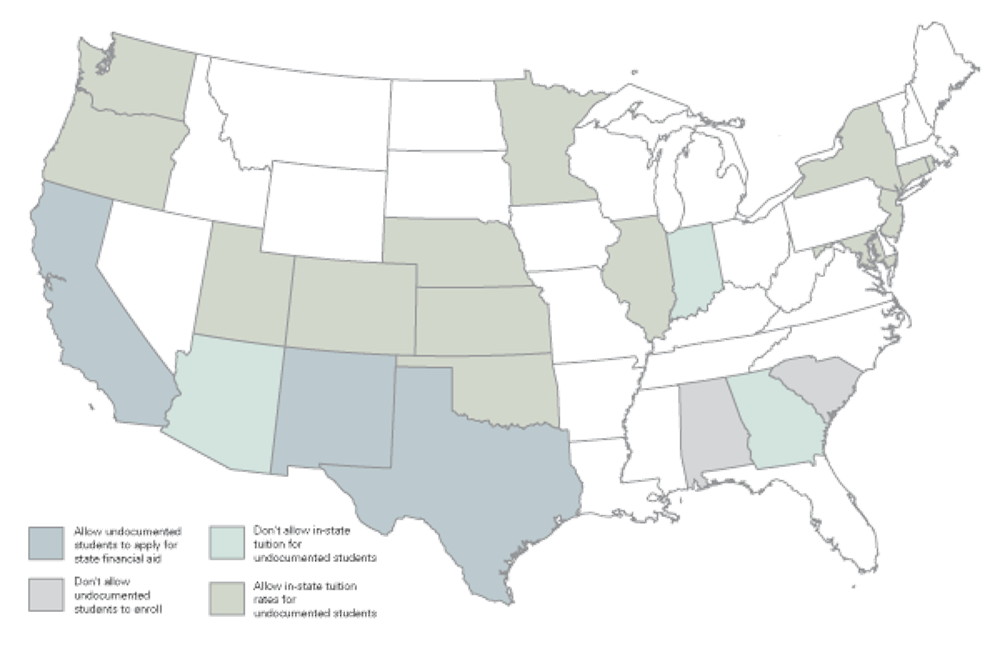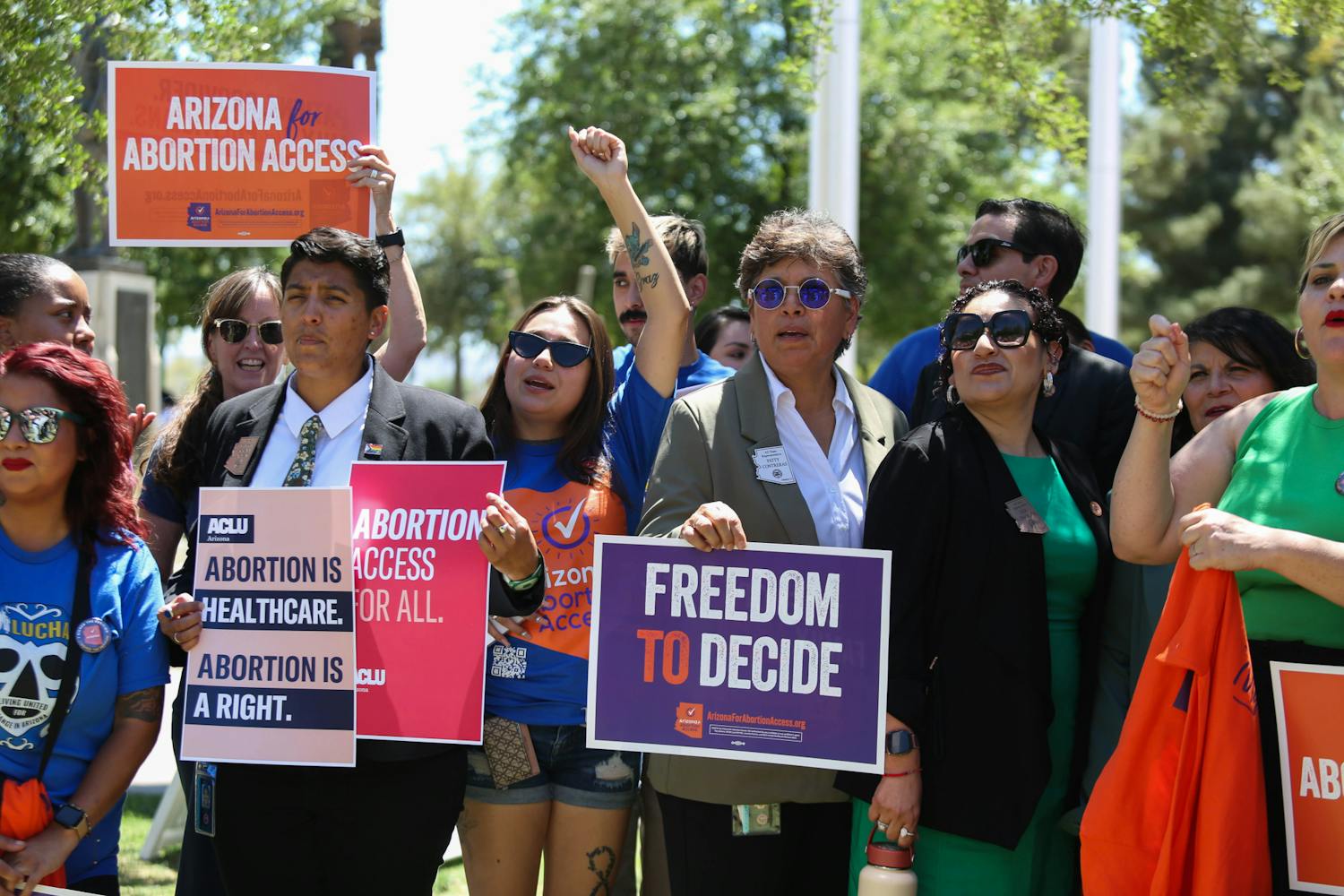Video by Erin Patrick O'Connor | Multimedia Editor
For students like Korina Iribe Romo, the dream of attending ASU or another Arizona public university is just too far out of reach.
Iribe Romo, an Estrella Mountain Community College student, said she hoped to enter ASU after graduating from high school, but as an undocumented student, Arizona law required her to pay out-of-state tuition.
"When I graduated, my goal was to go to a university, but the tuition was a price that I wasn't able to afford," Iribe Romo said.
In November 2006, Arizona voters approved Proposition 300, which prohibits those without proof of legal residency from being classified as in-state students for tuition purposes and from receiving state and federal financial aid.
The difference in tuition for in-state and out-of-state undergraduate students on the Tempe campus is about $7,000 for the spring 2014 semester, which creates a barrier for DREAMers seeking a college education.
DREAMer is a term for people between the age of 15 and 31 who came to the U.S. before the age of 16, don't have proof of legal residency and obtained a high school diploma or GED certificate in the U.S. They take their name from the Development, Relief, and Education for Alien Minors Act, a piece of legislation proposed in the U.S. Senate in 2001 that would grant conditional permanent residency to young people who attended college or served in the military.
Proposing a Change
At the Nov. 22 meeting of the Arizona Board of Regents, Regent Dennis DeConcini proposed changing the tuition rate for students without legal proof of residency to be 110 percent of what residents pay. The proposal failed.
Regent Jay Heiler said the board has been researching the issue and possible solutions for more than a year, but legal restrictions proposed by Proposition 300 limit what it can do.
"You have to weigh (the situations of DREAMers) in light of all the law, and then you have to go through the normal deliberative process to determine the will of the board," Heiler said. "Those things take some time, and that's why the policy has been under consideration for more than a year."
Heiler said the board will continue to research and consider the policy, but he said he feels a change in tuition would ultimately benefit Arizona.
"Any meaningful reduction in the tuition rate will make the university education more accessible for this cohort of students," Heiler said. "That runs down to the benefit of not only the students, but the universities and the state, which benefits from producing highly qualified college graduates."
The failed proposal also had the support of ASU's student governments.
German Cadenas, vice president of external affairs for the Graduate and Professional Student Association, said the proposal is closer to what it should be.
"The student governments at ASU are for the 110 percent," Cadenas said. "This is speaking on behalf of all ASU students by way of their student governments. I think it's not ideal, but it's better, and I think we're moving in the right direction."
Cadenas, who is a counseling psychology graduate student, was a DREAMer before he adjusted his immigration status to be a legal permanent resident.
He had to rely on private scholarships and donations through gofundme.com to pay for part of his undergraduate degree. He used the same methods to fund the first year of his graduate degree, which cost roughly $25,000 a year, before adjusting his residency status.
"What was really difficult was that I had to pay three times more than residents even though I graduated from a school in Tempe and even though I paid my taxes," Cadenas said.
 Third-year law student Daniel Rodriguez graduated from ASU as a DREAMer in 2008 after losing his in-state tuition rate and state-funded scholarships due to Proposition 300. Rodriguez is an advocate for the DREAM Act and co-founded the Arizona DREAM Act Coalition. (Photo by Andrew Ybanez)
Third-year law student Daniel Rodriguez graduated from ASU as a DREAMer in 2008 after losing his in-state tuition rate and state-funded scholarships due to Proposition 300. Rodriguez is an advocate for the DREAM Act and co-founded the Arizona DREAM Act Coalition. (Photo by Andrew Ybanez)Fundraising for Tuition
Like Cadenas, third-year law student Daniel Rodriguez lost his in-state tuition rate and state-funded scholarships, including the Presidential Scholarship, when Proposition 300 passed while he was working toward his undergraduate degree in English and political science.
Rodriguez, who was a DREAMer at the time, joked that he then "sold his soul" to pay for the remaining years of his undergraduate degree and his graduate program.
"I have paid semester-by-semester," he said. "I have applied to basically every scholarship that is available. I worked and saved. I also do a lot of fundraising."
After his first year at the law school, he decided to take a break to advocate for the DREAM Act.
"I had to make a choice. I could continue to fundraise $40,000 a year, or I could take an opportunity that I saw," Rodriguez said. "I knew there was a lot of potential to ... train this group of immigrant students so we could become the voice of this moment."
During this time, Rodriguez trained leaders, organized groups and helped fellow DREAMers tell their stories.
Rodriguez, who returned to ASU in 2012, said he thought the proposal introduced by DeConcini was fair.
"I was very saddened that this proposal didn't go through," he said. "I think it was a fair proposal that would be upheld legally, and it would have been something that would have helped us move forward on this issue."
He said he hopes the Board of Regents or the state Legislature will change the policy because the nonresident tuition rate makes it difficult for many undocumented students to get a college degree.
"DREAMers aren't going anywhere," Rodriguez said. "We are staying here, and we are going to contribute here. Why would you deny a whole generation of Americans an education?"
Rodriguez has Deferred Action for Childhood Arrival status under an August 2012 executive order by President Barack Obama. It grants two years of lawful presence and a work permit to people without proof of legal residency between the ages of 15 and 31 who were brought to the U.S. before they turned 16, who have no criminal record and have obtained a high school diploma or GED certificate.
Rodriguez has lived in Arizona since he was 6 or 7 and graduated from Trevor G. Browne High School.
Community Colleges' Policy
Confusion about what DACA means has created issues in securing resident tuition rates, Rodriguez said.
"Lawful presence is not lawful status, and that has been one of the misconceptions about what DACA grants," he said. "Essentially, what that means is you are not deportable and the government says, 'We know you are here, and we know you don't have lawful status, but we are not going to do anything about that.'"
Administrators at the Maricopa Community Colleges have been allowing DACA recipients to pay in-state tuition because a federal work permit is one of several documents, including a driver's license, used to establish lawful presence, MCC Spokesman Tom Gariepy said.
"That federal work permit is one of a number of documents that a person can use to establish what's called 'lawful presence' in Arizona," he said. "Determining lawful presence is the first step to gaining in-state tuition."
In June 2013, Attorney General Tom Horne filed a lawsuit against MCC because the policy may conflict with Proposition 300.
"What we are doing is following the law," Gariepy said. "Our conviction is that we are doing nothing more or less than we did prior to President Obama establishing the DACA policy."
Horne's office declined to comment because of the ongoing investigation.
On Dec. 2, ASU President Michael Crow said he supports making access to ASU easier for DACA recipients and undocumented students, but legally, ASU doesn't support allowing a DACA recipient's work permit to establish lawful presence.
"Our legal analysis is that (lawful presence given by DACA and requirements needed to be considered a resident) do not mean the same thing," Crow said. "I wish they meant the same thing because then it would be fixed ... but our legal analysis, including outside counsel, is that they do not mean the same thing."
Crow said he wants to comply with the laws but still help all students succeed at obtaining their university degrees.
"What I'm for is fairness and recognition of life challenge, and so for students who are here in the United States through no action of their own ... we should try and find a way we can stay consistent with the state's laws and constraints and find a way for them to have a better access and opportunity to ASU."
 Third-year law student Daniel Rodriguez hopes to see the state Legislature change policies that currently force DREAMers to pay non-resident tuition rates. (Photo by Andrew Ybanez)
Third-year law student Daniel Rodriguez hopes to see the state Legislature change policies that currently force DREAMers to pay non-resident tuition rates. (Photo by Andrew Ybanez)How Arizona Stacks Up
Arizona is one of three states, along with Georgia and Indiana, that expressly deny in-state tuition rates to DACA recipients or students without proof of legal residency.
In contrast, 17 states offer resident tuition rates to these students either through a decision by their boards of regents or through state legislation.
Border states such as California, New Mexico and Texas also allow these students to apply for and receive state financial aid.
In 2001, California and Texas became the first to pass legislation allowing students without legal status to qualify for in-state tuition.
Teri Albrecht, director of International Student and Scholar Services at the University of Texas at Austin, said in an email that Texas Senate Bill 1528, which allows students to qualify for state financial aid, requires students to graduate from a high school or get a GED certificate in Texas, live there for three years before graduating from high school and sign an affidavit saying they will seek to become a permanent resident as soon as they can.
Future Legislation
In coming months, Rep. Martin Quezada, D-Avondale, said he plans to introduce a bill that would set tuition for DREAMers at 110 percent of in-state tuition.
"It's a fair amount," Quezada said. "It's higher than (the) in-state tuition amount, but it's not out of reach."
While Quezada said he is unsure whether a bill like this would pass, he said lowering tuition for DREAMers would help Arizona's economy by allowing more students to go to college and keeping them in Arizona once they graduate.
"The Board of Regents, which politically is divided, was willing to consider the issue for a short time," Quezada said. "My hope is that we will at least listen to the argument."
Rep. Catherine Miranda, D-Phoenix, said lawmakers are talking to the Board of Regents and community colleges to get a discussion going about changing tuition because there is no political will to change the policy at this time.
"We need a well-trained, well-skilled workforce to contribute to our economy, and I don't think that discussion has been made," she said. "It's time to ... have a discussion about what is good for Arizona and what's not. I don't think either side can say that educating students is not good."
Chris Leone, communications specialist for the Arizona House of Representatives Republicans, declined to comment to avoid speculation.
Tim Sifert, director of communications for the Arizona Republican Party, declined to comment because his group has no goals regarding this issue.
Mike Philipsen, director of communications for the Arizona Senate Republican Caucus; Andrew Wilder, spokesman for Gov. Jan Brewer; and the Greater Phoenix Tea Party Patriots did not respond to repeated phone calls and emails requesting an interview.
Reach the reporter at sgslade@asu.edu or follow her on Twitter @shelbygslade
Correction: Because of a reporting and editing error, Mike Philipsen had the wrong title in an earlier version of this article. It has been updated.




